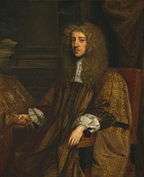
Anthony Ashley Cooper, 1st Earl of Shaftesbury (22 July 1621 – 21 January 1683), known as Sir Anthony Ashley-Cooper, 2nd Baronet, from 1631 to 1661 and as The Lord Ashley from 1661 to 1672, was a prominent English politician during the Interregnum and during the reign of King Charles II. A founder of the Whig party, he is also remembered as the patron of John Locke.
- (Not to be confused with his grandson, Anthony Ashley-Cooper, 3rd Earl of Shaftesbury.)
About Anthony Ashley-Cooper
- I will dwell a little longer on his character; for it was of a very extraordinary composition. He began to make a considerable figure very early. … He had a wonderful faculty in speaking to a popular assembly, and could mix both the facetious and the serious way of arguing very agreeably. He had a particular talent to make others trust to his judgment, and depend on it: and he brought over so many to a submission to his opinion, that I never knew any man equal to him in the art of governing parties, and of making himself the head of them. He was, as to religion, a deist at best.
- Gilbert Burnet, in Bishop Burnet's History of His Own Time (1823), Vol. I, p. 164

Men of sense are really but of one religion. … men of sense never tell it.
- A person came to make him a visit whilst he was sitting one day with a lady of his family, who retired upon that to another part of the room with her work, and seemed not to attend to the conversation between the Earl and the other person, which turned soon into some dispute upon subjects of religion; after a good deal of that sort of talk, the Earl said at last, "People differ in their discourse and profession about these matters, but men of sense are really but of one religion." Upon which says the lady of a sudden, "Pray, my lord, what religion is that which men of sense agree in?" "Madam," says the Earl, "men of sense never tell it."
- Note by Speaker Arthur Onslow in Bishop Burnet's History of His Own Time (1823) by Bishop Gilbert Burnet, Vol. I, p. 164.
- For close designs and crooked counsels fit,
Sagacious, bold, and turbulent of wit,
Restless, unfixed in principles and place,
In power unpleased, impatient of disgrace;
A fiery soul, which, working out its way,
Fretted the pigmy-body to decay
And o'er informed the tenement of clay.
A daring pilot in extremity,
Pleased with the danger, when the waves went high,
He sought the storms; but, for a calm unfit,
Would steer too nigh the sands to boast his wit.
Great wits are sure to madness near allied
And thin partitions do their bounds divide;
Else, why should he, with wealth and honour blest,
Refuse his age the needful hours of rest?
Punish a body which he could not please,
Bankrupt of life, yet prodigal of ease?
And all to leave what with his toil he won
To that unfeathered two-legged thing, a son,
Got, while his soul did huddled notions try,
And born a shapeless lump, like anarchy.
In friendship false, implacable in hate,
Resolved to ruin or to rule the state.- John Dryden, Absalom and Achitophel, 1681.
External links
This article is issued from
Wikiquote.
The text is licensed under Creative
Commons - Attribution - Sharealike.
Additional terms may apply for the media files.